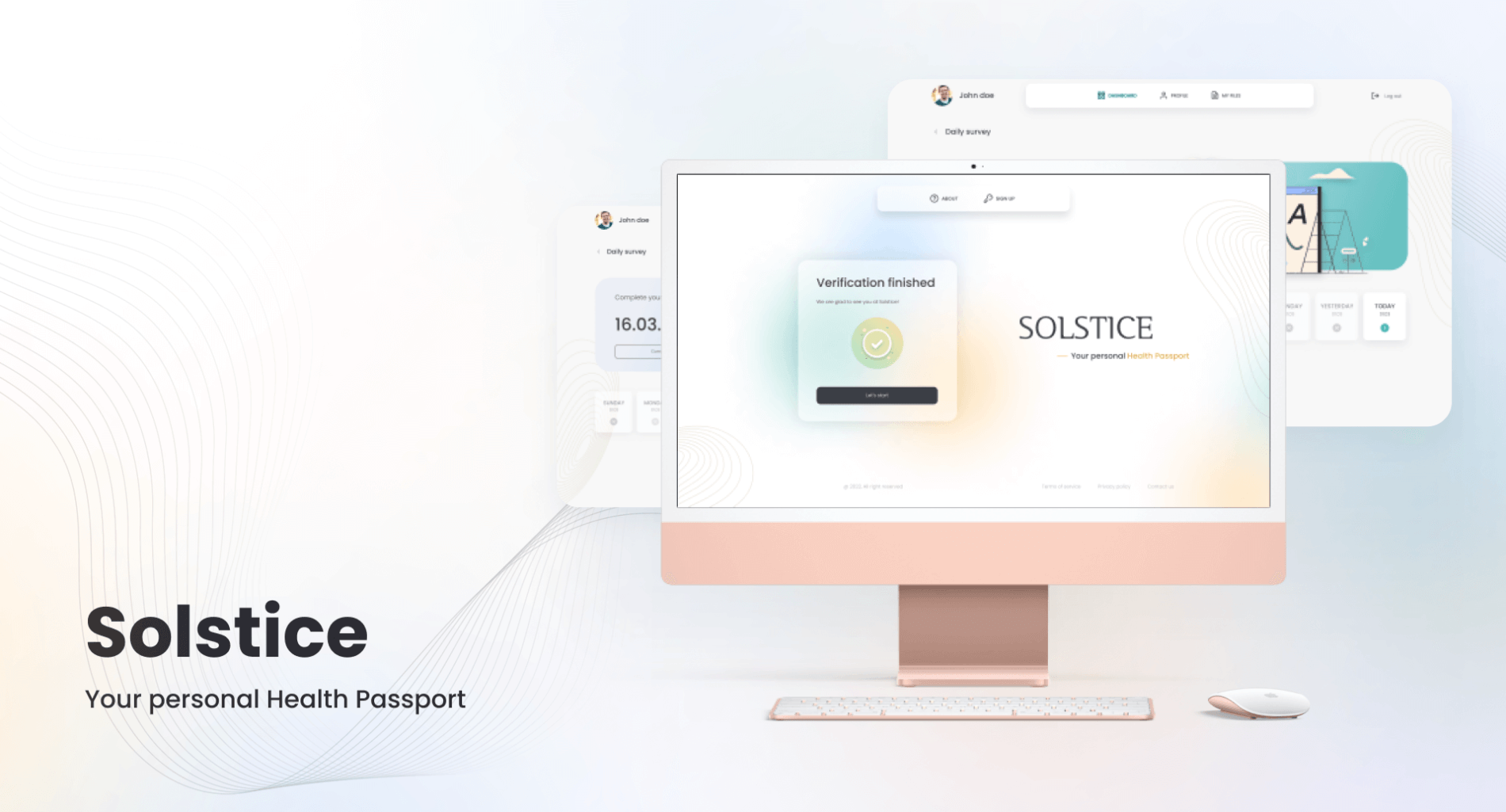The healthcare domain is undergoing a technological transformation driven by emerging tech trends and innovative research findings. Blockchain plays a crucial role in this transformation, providing growth opportunities, fostering security and transparency, and prioritizing high-quality patient care. In this article, we look at how blockchain helps healthcare facilities streamline operations and cut costs.
 $17.46 billion
$17.46 billion
The global blockchain technology market size was valued at around $17.46 billion in 2023.
 $1.97 billion
$1.97 billion
The global market size for blockchain technology in healthcare was valued at $1.97 billion in 2022.
 $1.6 billion
$1.6 billion
The global market size for smart contracts in healthcare was valued at $1.6 billion in 2021.
The Role of Blockchain in Healthcare

Healthcare is a data-intensive and regulations-rich industry, so ensuring security and compliance when storing and accessing medical data is vital. Here’s where blockchain technology is pivotal, simplifying data exchange and management, improving protection, and streamlining communications.
Blockchain is a decentralized, distributed system used for conducting transactions and viewing, storing, and exchanging data on the network. It operates as an immutable record ledger consisting of transaction blocks linked with cryptography. With no central authority, records are dispersed among network participants and authenticated collectively, encouraging a system of trustless collaboration.
The immutable nature of blockchain ensures that data blocks are impossible to alter or delete without leaving a trace, a crucial feature for the safekeeping of medical data. This technology plays a critical role in keeping patients’ health records, research, and clinical trial data secure and ensures regulatory compliance essential for the medical field.
The Tech Side of Blockchain in Healthcare
Large-scale enterprises, including Microsoft and IBM, as well as emerging startups, leverage blockchain to build healthcare software that addresses real challenges in the medical field and paves the way for future innovations.
-
1 Private Blockchain
Private blockchains offer improved security and are restricted to selected participants, which makes them a popular choice among healthcare organizations. Private blockchains maintain the integrity of medical records and transactions and ensure unprecedented confidentiality.
Leading blockchain software developers recognize the technology’s potential, with companies like IBM creating private blockchain solutions in collaboration with healthcare providers to suit the needs of the medical field.
-
2 Tokenization in Healthcare
Tokenization is quickly gaining momentum across multiple industries, including real-world assets tokenization and healthcare. The technology promises to enhance efficiency and access protection in multiple aspects, from refining insurance processes to facilitating patient identity verification.
One example is Healthureum, a project using tokens to streamline healthcare services and ensure transparent billing processes and timely medical services.
-
3 Smart Contracts
Blockchain-based smart contracts are self-executing pieces of code deployed on a blockchain when predefined conditions are met. Medical institutions can utilize smart contracts to validate transactions and lower costs by eliminating intermediaries.
-
4 Hyperledger Fabric
Advanced encryption techniques help Hyperledger Fabric protect data at rest and in transit and ensure its authenticity, privacy, and integrity. The technology provides enhanced interoperability through a standardized data exchange and integration framework. The modular architecture enables seamless data sharing and real-time data access.
Hyperledger Fabric also helps healthcare organizations reduce overhead costs by automating administrative tasks, streamlining processes, and eliminating the need for intermediaries.
Change Healthcare, a healthcare technology company, collaborated with Adobe to craft a Hyperledger Fabric-powered system for medical claims management. The system streamlines the claims processing, enhances transparency in the reimbursement process, and reduces administrative costs.
-
5 Zero-Knowledge Proofs
Zero-knowledge proofs (ZKPs) are a cryptographic technique allowing one party to prove specific information to another without revealing any additional details.
An example of this technology is zPass on Aleo Blockchain. The technology gives patients ownership and control of their health data, builds trust, and contributes to better outcomes for patients and medical providers.
With zPass, patients can choose what information they want to share with healthcare professionals without providers storing and protecting that data in their digital systems. zPass on Aleo also improves security with the help of decentralized validator nodes, ensuring the security of personal data and protection against data breaches and cyber-attacks.
Learn how your healthcare business can boost efficiency and reduce costs with blockchain!
Let's talk5 Ways Blockchain Reduces Costs in Healthcare
-
Drug Traceability
Blockchain improves drug supply chain management by offering advanced security and accountability through its provision of immutable and accurate records of transportation and operations. High interoperability between blockchain systems and applications ensures their coherent interaction. This allows pharmaceutical companies to register drugs on the network and monitor their movement from production sites to end consumers.
The technology optimizes supply chain management and allows manufacturers and sellers to predict demand and supply, thus reducing additional costs.
Increased transparency also allows the verification of the authenticity of drugs and their manufacturing locations with the help of records on the blockchain, preventing counterfeit medicines.
-
EHR Management
Blockchain significantly simplifies and automates electronic health records (EHR) management and storage. Decentralized databases allow patients’ medical records to be transferred between various healthcare institutions, easily accessed, and quickly updated.
The use of blockchain for EHR management facilitates accurate diagnosis and continuity of care while ensuring the security of medical data exchange and protecting patients’ privacy. This, in turn, can mitigate the risk of companies incurring significant financial penalties due to medical data breaches, potentially saving them millions of dollars.
-
Expedited Credential Verification
Much like the tracking of medical goods, blockchain can be used to register and monitor the experience and credentials of healthcare professionals. Trusted healthcare organizations and medical institutions can log the data regarding their staff’s qualifications into the system, accelerating the verification of qualifications in the medical field.
The technology reduces inaccuracies and fraud, prevents potential data leaks, and streamlines hiring processes. Blockchain adoption saves time, money, and space needed to store and manage the extensive data of medical professionals.
For example, ProCredEx (The Professional Credentials Exchange), a US-based network-based market for verifying professional credentials, created its system using the R3 Corda blockchain protocol.
-
Healthcare Payments
Healthcare institutions, including clinics, hospitals, and health insurance companies, deal with numerous transactions and claims daily. The process involves handling sensitive data, such as credit cards and bank account details, underscoring why it’s vital to protect payment details from breaches.
Blockchain can be used to optimize payments and protect data from unauthorized access using cryptography. Each block on the blockchain is cryptographically linked to each other, creating a chain resistant to unauthorized access. The technology also simplifies transactions by eliminating intermediaries, which in turn accelerates payments and minimizes costs.
-
Health Insurance
Blockchain enables accessibility and interoperability and creates an immutable database providing real-time data for both insurance companies and healthcare providers. In this way, medical professionals can immediately access accurate data and validated confirmation of healthcare services directly from patients, eliminating the need for intermediaries.
Patients have the opportunity to purchase medical insurance policies using smart contracts with blockchain offering a more secure storage of policy details and patients’ data than traditional databases. Smart contracts can be automatically triggered when a patient undergoes a medical procedure covered by insurance to transfer money to the healthcare facility, automating insurance payments.
How Can Interexy Help?
At Interexy, our team has extensive expertise in building cutting-edge blockchain solutions tailored for various industries. We specialize in custom application development and offer comprehensive blockchain, healthcare, and fintech app development services. Our experts can assist healthcare facilities in integrating blockchain into their operations and services to boost overall performance and efficiency.
Our team of blockchain and healthcare experts can guide you through the implementation of blockchain technology, integration with existing systems, and creating custom solutions from scratch that meet your organization’s unique requirements.
Final Thoughts
While blockchain technology is still emerging, several of its applications in healthcare have already proven effective. Beyond boosting the efficiency of healthcare professionals and simplifying medical data management, blockchain adoption in healthcare has proven instrumental in reducing costs, streamlining operations, and minimizing fraud. By focusing on a patient-centered and data-driven approach, blockchain not only enhances patient outcomes but also delivers substantial cost savings for healthcare organizations. As the industry continues to utilize blockchain technology, its transformative impact on both patient care and financial efficiency will undoubtedly continue to evolve.

FAQs
-
How is blockchain utilized in healthcare?
Blockchain has many use cases in healthcare, including storage and management of patients’ medical data and clinical trial data. The technology provides a secure and efficient way to store and interact with information through a decentralized, immutable ledger, protecting the data from unauthorized access and fraud. Blockchain also streamlines supply chain management for pharmaceutical companies and facilitates the development of telemedicine and IoMT (Internet of Medical Things) devices. Additionally, blockchain-based smart contracts automate insurance claims processing, reduce claim settlement time, and increase the efficiency of health insurance companies.
-
What blockchain should be selected for healthcare solution development?
The majority of already existing healthcare solutions are built using the Ethereum blockchain. However, there is no universal tool for everyone; therefore, you must consult an experienced blockchain development services provider about what technology to use.
-
What is the best blockchain solution to enhance electronic health records management?
The ideal choice would be a widely adopted, fast, and cost-effective solution. Today, the most popular blockchain solutions are Solana (SOL), Polygon (MATIC), and Arbitrum (ARB).





